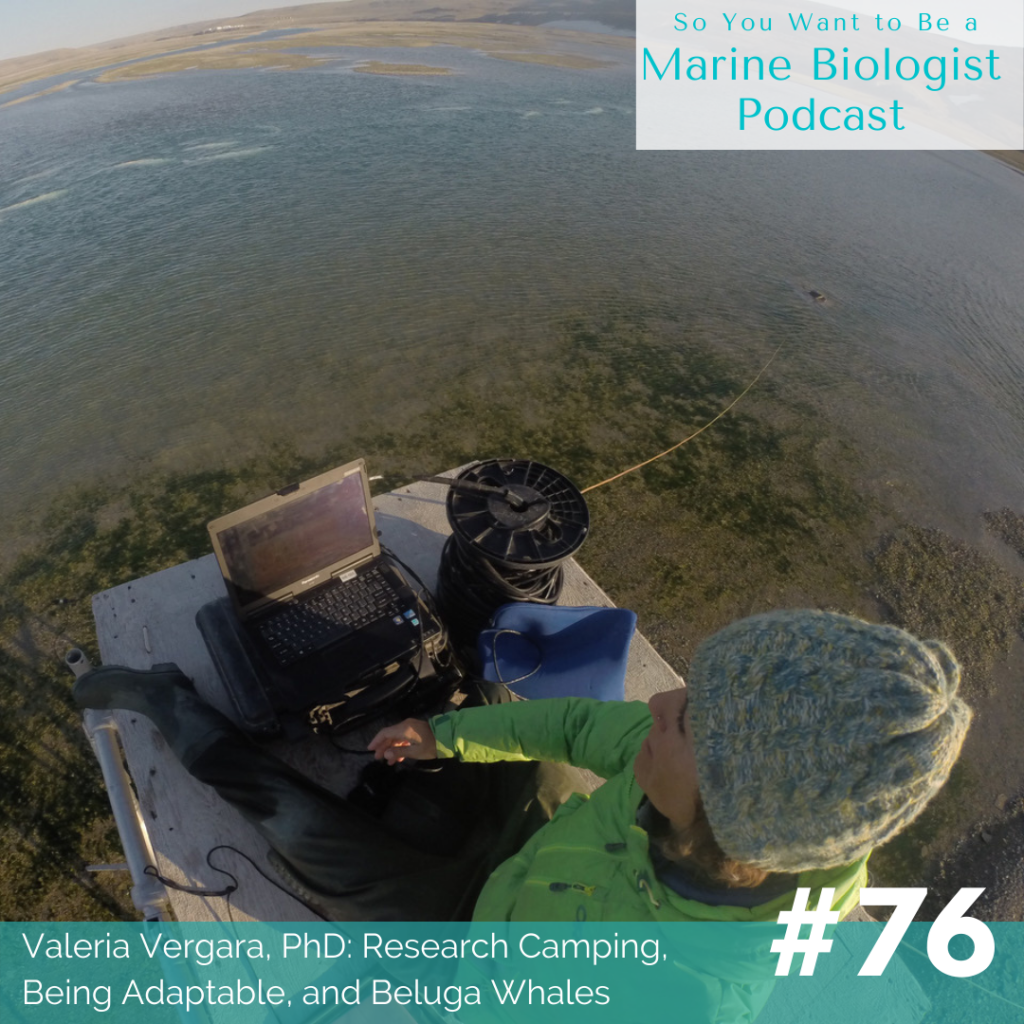Valeria Vergara is a senior research scientist at Raincoast Conservation Foundation where she co-directs the Cetacean Conservation Research Program. Her main focus? Beluga Whales. Originally hailing from Argentia, Valeria studied canids- specifically coyotes and foxes- during her undergrad and masters degree. It wasn’t until her PhD that she switched to the marine world. Valeria is so passionate about her work, and shares insight into what beluga whale research looks like, including spending weeks at camp with these creatures. She also shares why belugas are considered the canaries of the sea, why it’s important for us humans to be adaptable, and she shares some amazing stories from the field.
Connect with Valeria: website | Twitter
Quick Links
Canadian International Development Agency
Trent University
Canids
Yellowstone National Park
David Mech
Yellowknife
Jane Goodall
Jeanne Altmann
Buenos Aires
Argentina Wildlife Fund
Darwin’s foxes
University of Alberta
Cetaceans
Beluga whale contact calls
Mobile hydrophone
Cunningham Inlet
High arctic Baffin Bay
St Lawrence Estuary beluga population
Acoustic fog
Acoustic sanctuaries
Finding Dory, beluga whale
Raincoast Conservation
Show Notes
2:15 – Before Valeria researched beluga whales, she did field research on canids, including in Yellowstone National Park.
5:04 – If your path takes you through higher education, it is OK to take time off in between. Valeria took a decade off in between her Master’s and her PhD. In fact, when she finished her Master’s, she believed she was done with academia.
7:55 – In between her undergraduate studies and her Master’s, Valeria had her “Jane Goodall moment” studying baboons in Kenya. Before her Master’s she also studied humpback whales in Newfoundland.
9:33 – Throughout her field work, Valeria has been in a lot of camping situations including on a very remote island and in the African wilderness…Kara wants to know, did Valeria grow up going camping?
12:00 – Thanks to a scholarship for her PhD, Valeria was planning on studying Darwin’s foxes in South Africa, but a series of life events led her to eventually studying beluga whales.
14:47 – Kara wants to know: When Valeria transitioned her studies to the aquatic world, was it belugas right off the bat for her?
19:14 – Valeria found, during her PhD studies, that smaller groups of Beluga whales would break off from the massive herds (herds could be made up of roughly a thousand individuals) and swim up narrow rivers. This sometimes resulted in these smaller groups becoming trapped when the tide would go out.
21:35 – It’s very important for field biologists to be adaptable and be ready for things to not go as planned in the field. After all, as she says, “The animals haven’t read your proposal.”
25:06 – Valeria is always intentional about keeping respectful distances from the animals she studies so as to not disturb them, but she says it’s not rare for beluga biologists to have relatively close encounters with these curious animals.
28:14 – Although Valeria’s beluga whale research hasn’t focused on behavioral differences between various beluga whale populations, a Master’s student of Valeria’s has used recordings from Valeria’s research to compare the Baffin Bay population to the St. Lawrence Estuary one, and has found that the beluga whales in the St. Lawrence estuary population have contact calls at a higher frequency than their Baffin Bay counterparts.
31:04 – Sound for beluga whales is like vision for humans, Valeria explains just how important sound is for these animals.
32:48 – Kara and Valeria talk about communication between mother beluga whales and their calves.
37:30 – Beluga whales use what is called their “melon” to direct their sounds. You can actually see their melons move as they do this.
39:02 – For part of her research, Valeria, her research assistant, and her PhD student set up a camp for four weeks on a desert island in the St. Lawrence Estuary. She describes a little bit about what that was like.
41:29 – Valeria has recently started a new position with the Raincoast Alliance. She shares what she’ll be doing there.
43:23 – So, moment of truth: Is Valeria’s favorite sea creature the beluga whale?
44:21 – If Valeria was given a blank check, she would use it to commission an environmentally friendly research boat, a boat that she says, “walks the talk.”
46:11 – Having conducted years and years of research in the field, Valeria has a lot of amazing field stories. The one she shares is a heartwarming story about a beluga whale stranding, in which two adult beluga whales tried comforting a calf using various techniques while they were all trapped. Don’t worry, they all got out safely!
48:52 – Valeria tells the listeners that the impact of noise can be short-lived, which means that reducing sound in one area can have a significantly positive impact on marine life. She talks about different ways we can consciously reduce our noise pollution.
